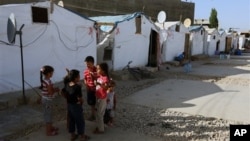Lebanese authorities have started to enforce new measures that would limit the number of Syrians entering Lebanon as part of efforts to reduce the more than one million refugees from the war-shattered nation already within their borders.
The move has prompted an outcry from rights groups who say that, by seeking to deny sanctuary, the Lebanese government is violating international law, a complaint Beirut officials deny.
When Syrian refugees began arriving in 2011, they were greeted with sympathy by Lebanese people appalled at the viciousness of the civil war being waged next door. But fatigue has since set in and anger is flaring over competition for scarce jobs at a time of price inflation and general economic malaise. With economic, political, and security worries increasing, compassion for Syrians is being replaced with frustration and fear.
“The mood has changed,” said Omar Abdul Rahmanam, an aid worker in the Bekaa Valley town of Bar Elias.
Impatience is rising, even among Lebanese who initially reached out to the refugees, he says.
“Things changed because of the big numbers of refugees who came here,” he said. “Even the way [Lebanese] people look at them and treat them has changed.”
The impatience is reflected in measures Lebanese authorities are now seeking to enforce. Under the restrictions, passed by the Lebanese Cabinet in June, refugee status will be granted only to Syrians “coming from regions where battles are raging near the Lebanese border,” according to Social Affairs Minister Rashid Derbas. Syrians arriving from further afield will be denied refugee status, although some humanitarian exceptions may be made.
Many Syrian refugees come from distant towns and villages of eastern Syria and the northern city of Aleppo.
Authorities also plan to strip refugees of their status if they return to Syria, however briefly. Families often send one member back to obtain medicines, which are cheaper in Syria, and to check up on family property and renew important Syrian identity documents, including passports.
Syrian-Palestinians, who comprise about five percent of the Syrians refugee population already in Lebanon, face additional hurdles: the burdensome administrative requirements and financial demands that aid workers claim are virtually impossible to meet.
One third of population
Numbering well over a million, Syrian and Syrian-Palestinian refugees make up nearly a third of Lebanon’s population. Some 825,000 are registered with the United Nations.
As more refugees flow into Lebanon, depleting U.N. funds and humanitarian aid — straining the resources, infrastructure and patience of the hard-pressed Lebanese — the refugee struggle is becoming harder. Securing enough food to feed large families, adequate accommodation, and jobs is a matter of survival.
That includes Syrian refugees who opened stores in the Bekaa Valley.
In recent weeks the Lebanese authorities have been shuttering their stores on the grounds they are illegal and lack the necessary permits.
According to Antoine Sleiman, governor of Bekaa Valley, hundreds of Syrian-run stores are being closed because owners lack the required paperwork. Denying the move is anti-refugee, he tells reporters “as long as it’s done according to the law and all the regulations of the state,” the Syrians can open stores.
But some commercial lawyers say the necessary permits are hard for Syrians to secure.
“Things are being weighted against them,” said one Lebanese attorney who asked not to be named.
Despite requests from the U.N. and aid agencies, Lebanese politicians have refused to open official refugee camps, fearing that doing so may encourage refugees to remain.
When it comes to shelter, the refugees currently have to fend for themselves. While the government says most have family and friends with whom they can stay, aid workers say that most refugees actually pay high rents for makeshift accommodation, stoking rental price inflation for the Lebanese as well.
Others live in the more than 1,000 makeshift camps.
Securing donations has also become harder for local charities, says Sheikh Mohammed Gamil Nizah, a Salafist cleric in the northern Lebanese city of Tripoli.
“Those who used to give money won’t now," he said. "I have big problems with funds to help refugees.”
But Derbas, the social affairs minister, dismisses criticism of the new restrictions on refugees, saying the sheer scale of the crisis forced authorities to take action in order to head off conflict between Lebanese and Syrian communities.
“We no longer accept that the Syrian crisis should be dealt with as a humanitarian issue,” he told reporters. “It’s a political issue.”




